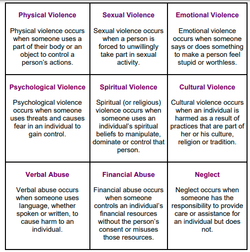Mar 31, 2022
Violence

What is violence?
Violence is the use of physical force so as to injure, abuse, damage, or destroy.
(1) What springs to mind when you hear the word ‘violence’?
(2) How often do you see violence in your country?
(3) What makes people violent?
(4) Is there a cure for violence?
(5) Do you think there’s too much violence on TV and in video games?
(6) Do you think humans will ever be nonviolent?
(7) Do you think men or women like violence more? Why do you think so?

Things to do
1) Never tell an abuser anything their partner has told you.
2) Learn about intimate partner violence yourself so you can help your friend or family member recognize their violent behaviors.
3) Identify the violence when you see it.
4) Remember to criticize the behaviour, not the person, or you will only succeed in making them defensive.
5) Educate the abuser about the different types of violence. Help them to realize the consequences of their behaviour. Offer your support if they choose to seek help.
6) Your friend or family member may try to blame the victim for the violence. Don’t support these feelings or help to justify the violence. Help them recognize that anger is an acceptable emotion, but hurting someone is not.
7) Help the abuser focus on the victim’s feelings and the serious harm the victim is experiencing because of the violence.
8) Don’t ignore violence that you hear about or see. Your silence helps the abusive person to deny that their behaviour is wrong.
9) Be clear that violence is always a choice, and that it is preventable. Acknowledge that it takes courage to talk about violence and to seek help to change. Offer your support if they choose to seek help.
10) Help the abuser to accept responsibility for the violence. Violence does not happen because one is “provoked” or “drunk.” Violence is a choice, and is used to gain power over another person.
Don’t give up. Behavioural changes can take a long time.
Set a positive example by building healthy, violence-free relationships in your own life!
By undefined
7 notes ・ 5 views
English
Beginner